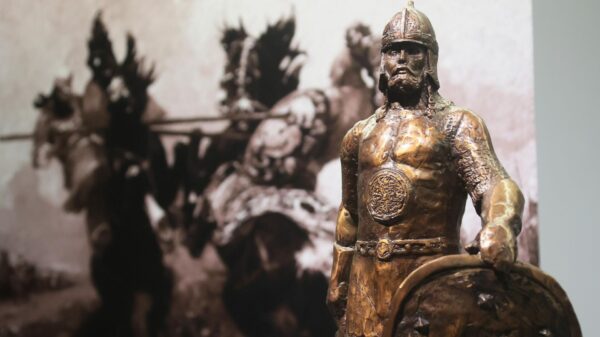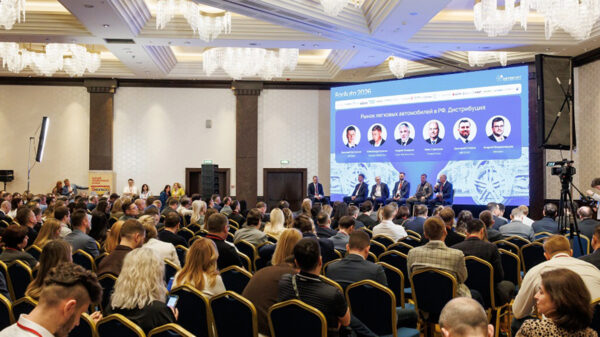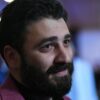 “I couldn’t let it get into my body and brain”: Sandra Hüller Photo: Sebastien Vincent
“I couldn’t let it get into my body and brain”: Sandra Hüller Photo: Sebastien Vincent
“Funny Feature of the Swiss uniform The thing about the German language,” explains Sandra Hüller, “is that even the most unpleasant words sound cozy and sweet.”
To illustrate, she looks into the eyes of the webcam and says something: in a foreign language, which could pass for Hobbit poetry: warm, sweet and bright, like an Alpine dawn in voice form.
– See? she smiles. “I just called you a disgusting, stupid pig.”
Hüller's linguistic skills have served her well lately, and not just when it comes to insulting film critics on Zoom. (To be clear, the above conversation was both intense and enjoyable.) The 45-year-old German actress is currently best known for her starring role in the 2016 comedy Toni Erdmann, in which she played an ambitious corporate consultant whose prank-loving the father goes on an important business trip without warning.
She speaks from her home in Leipzig, where she lives with her 12-year-old daughter and a black Weimaraner dog, the latter of which darts around happily in the background of the call. In conversation, it’s hard not to notice the similarities with her character Toni Erdmann: seemingly imperturbable composure; Quiet fun bubbles underneath him.
Her two latest films are French and British; both among the best of the year — giving her every reason to sizzle. At Cannes in May, they together received the festival's two highest awards: the Palme d'Or and the Grand Prix. Hüller, who plays a different but equally fearless lead in each, is already considered a potential Oscar nominee in both, perhaps even both.

Anatomy of a Fall, which opens in UK cinemas next Friday, will be released first. Directed by France's Justine Trieu, with whom Hüller last worked on the psychosexual thriller Sibyl in 2019, it's a slippery modern detective story in which the question is not just who, but also Sgt. Hüller plays a successful novelist whose husband — also a writer, albeit a frustrated one — falls to his death from the top floor window of their Alpine chalet.
Or perhaps from the balcony below. Perhaps she pushed him, or perhaps he jumped on purpose, or perhaps it was an accident. Triet created the film specifically for Hüller — the main character is even named Sandra — and although she is German, we hear her speak only English (at home) and French (in court), in roughly equal proportions. We are left to decipher it, knowing that every thought it expresses is mediated; every confession is glossy.
Switching between languages, Hüller says, “made something switch in my body. It's as if each of them not only changes the way you communicate and express yourself, but also shapes the way you carry yourself and move.»
She said this was vital to finding out who Sandra was, especially since much of the puzzle was hidden from her throughout filming. During filming, Triet never told her whether Sandra killed her husband or not.
At first, she says, “I found myself clinging to certain facts in the scenario that seemed crucial—for example, if she really did it, I told myself that that would mean she would also have to come to terms with the fact that the fact that their little son could find his father's body seemed impossible. But I mean,” she smiles, “she could have.”
In the end, she decided to play the role “as if Sandra thought she didn’t do it, and if she did, then , like many criminals, there was some mechanism in her head that insisted otherwise. So I actually cheated.» After watching the film, did she understand this?
“I still don’t know,” she laughs. “And if Justine knows, she hasn’t told me yet.”
 '»I still had huge doubts»: Hüller in the area of interest. Photo: Album/Alamy Stock Photo
'»I still had huge doubts»: Hüller in the area of interest. Photo: Album/Alamy Stock Photo
Hüller's other new film tackles this problem and turns it on its head. In Zone of Interest, Britain's Jonathan Glazer's first feature film in a decade, she plays Hedwig Höss, the proud homely wife of Rudolf Höss, commandant of Auschwitz. There is no ambiguity here: the woman is involved in genocide. Her tastefully furnished family home adjoins the camp itself; the flowers in her manicured garden grow from the ashes of dead Jews.
However, Hedwig's comfortable life and her husband's status as one of the coldest accomplices of the Holocaust are sources of nothing but pride. It muffles the constant roar of stoves and the crackle of gunfire as if they were noise pollution from a nearby road.
Like most German actors, Hüller had been asked to play Nazis at various points in his career. . But on principle she always refused — fearing that she might endear herself to such a person or somehow romanticize her nation's dark past. However, something about Glaser's presentation was different.
“I still had huge doubts,” she says. “I've had a lot of conversations with both Jonathan and my family and friends. Ultimately, I decided to do it because I don't think I'm playing a character in a movie—I'm playing an element or a piece of a puzzle. I couldn't let it enter my body and brain. And this is the first and last time I will play such a role. It's the only way I can imagine.”
What helped, she continues, “was hearing the doubts Jonathan had about how things could have gone so wrong. But I felt like something needed to be done. Because we have to show these people as they were. There is a human obligation not to turn away.”
 “I found myself clinging to certain facts”: in the anatomy of Autumn Credit: Les Films Pelléas
“I found myself clinging to certain facts”: in the anatomy of Autumn Credit: Les Films Pelléas
In Glazer's film inspired by the same name Martin Amis's 2014 novel emphasizes the need not to show the atrocities at Auschwitz directly. But as the Höss family carefully turns a blind eye to this, viewers only become more aware of what is being ignored.
Cinema is a natural medium for empathy: all its basic tools, from lighting to camera angles, ultimately serve this purpose. So finding a way to “film these people without filming them,” as Hüller puts it, was key to the project's success. Glaser decided to restore the former Nazi headquarters, located just a few feet from Auschwitz itself, and fill it with static surveillance cameras that could coolly observe the Hesses in their lives. The cameramen themselves were in the basement, and Glaser directed the filming through headphones from a nearby barn. Hüller describes the process as completely different from performance in the traditional sense.
“There was no artificial light, no close-ups, no idea what angle would be used. And this created tension: the feeling of constant surveillance made the cameras seem more like people or entities. It was a technical thing, but it became something else.”
To prepare, she visited Auschwitz for the first time. “I always felt that when I went, it would somehow provide an answer—that later I would somehow understand this terrible chapter of our history.” She pauses. “But that didn’t happen at all. It just made it clearer how confusing it all was.”
She also delved into her family history—at least as deeply as she could. Hüller was born in 1978 in rural East Germany, just over a decade before the fall of the Iron Curtain. Both of her parents were teachers born after the war, but Hitler had only been in power a generation before.
“So I researched my own ancestry to see if anyone was an active Nazi,” she said. she. speaks. “I mean, I know that older members of my family served in the Wehrmacht. But at that time they were young and drafted, not by choice.”
 Unperturbed Freuder: Hüller attracted everyone attention thanks to his performance in the German comedy «Toni Erdmann» Photo: NFP
Unperturbed Freuder: Hüller attracted everyone attention thanks to his performance in the German comedy «Toni Erdmann» Photo: NFP
She asked her surviving older relatives if anyone was a party member. «They all told me, 'No, there was no one there.' She also looked through family documents — «And, of course, there were no written records of this either.» Did she feel relief? She hesitates and looks lost for a moment. “I can’t believe I didn’t have any of these people in my family,” she says finally. “Because look at my country — it’s full of them.”
Neither cinema nor the theater, her first love, featured in Hüller's early childhood under communism: the Polish cartoon Bolek and Lolek was about as cultured as she was. But soon after the fall of the Wall, her imagination was captured by a trip to the drama department in Berlin, and she applied to the city's prestigious Ernst Busch Academy of Dramatic Art, which was known as a talent incubator back in GDR times.
“School taught me that theater is a place where it’s easier to talk,” she says. “Sometimes he was coded, but everyone knew the codes. So it was an open space just like ours.” By the time she enrolled there in the mid-1990s, “it felt like you could do whatever you wanted.”
Over the next two decades, she moved between stage and screen and found her niche in both. In 2003, she was named Young Actress of the Year by Theater Heute magazine. In 2006, she won the Silver Bear at the Berlin Film Festival for her performance as a young devout Catholic in Hans-Christian Schmid's Requiem, who becomes convinced that her epilepsy is the work of evil spirits.
But the recognition is much greater wider. for Toni Erdmann — he won a European Film Award and was nominated for an Oscar — she was embarrassed. The initial wild reception at Cannes was «a lot of fun», but for months afterwards she «didn't know how to move on from it». The obligatory trip to Hollywood for “meetings” followed, but no work followed. Was Star Wars or Marvel trying to get her?
“No,” she snorts with a laugh that evokes a deep sense of relief. “But it was a strange moment. My attitude towards the profession has not changed. My dreams haven't changed. But it was like I was thrown off track.”
With these two new films, has she found it again?
“Oh yeah,” she laughs. “I’m really enjoying the trek this year.”
Anatomy of a Fall will be released in theaters on November 10th. «Zone of Interest» will be released next year
























































Свежие комментарии